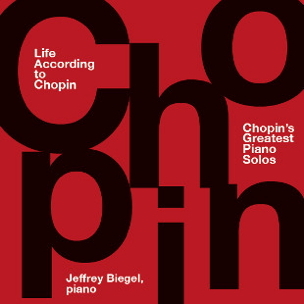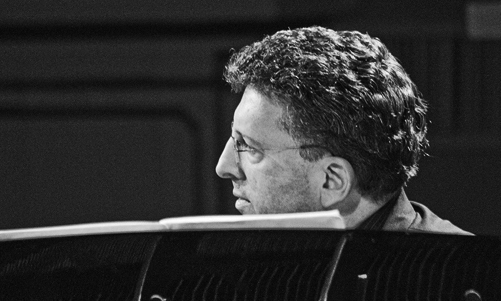Pianist Jeffrey Biegel's latest CD, Life According To Chopin: Chopin's Greatest Piano Solos may be the first tell-all among a colossal number of recordings dedicated to the work of Frédéric Chopin. The eleven tracks represent an overview of the musical forms that shaped him as a composer and pushed him into celebrity status as a concert artist. The CD is a biographical recital of sorts, but one poised for the section marked: The only Chopin you will ever need.
On the same shelf will be found Artur Rubinstein's ever-marketable album from 1971, The Chopin I Love and Van Cliburn's mega-hit from 1962, My Favorite Chopin. And perhaps in a glass case, a true blockbuster -- José Iturbi's Music to Remember. During our recent interview, Jeffrey described a controlling force in Chopin's writing and how it informs tradition and performance.
"If you told me in the 1970s," said Jeffrey,
When I was studying Bach, Mozart and Chopin -- that I'd make recordings of their music, I would have replied, 'No way!' Why? Because there are so many recordings already. Why would anyone need another? But as the decades moved on, there have been so many schools of thought about how to play their music. And many years have passed since the great recordings were released. So, I took the hat off of all my different influences - the various recordings, the master classes, my own teachers, and the many different editions of the music. What should I follow? Which one is right?
After a while, teaching my own students helped me to evolve into not putting my hat on, but the composer's. 'OK, what do you want me to do?' After years of studying Bach, Mozart and Chopin, the commonality on the piano is the ability to create a singing sound and a vocal line. Period. If I cannot sing the line and play it at the same time, then I'm doing something wrong. We don't like to say there is a right and wrong way in playing. But the older I get, the more I realize -- yes, there is! There is a right and wrong. Because if you are able to sing a musical phrase, even with the worst imaginable voice -- you should be able to sing the phrase with the amount of air God gave you to breathe. If you're singing it too slowly, you will have to grab a breath. If you get to the end of the phrase with air to spare -- that's wrong, too. The voice is the most natural instrument whether it sounds good or not.
My sheet music and record library includes a number of arrangements of popular songs based on themes by Chopin. As a kid, I knew three of these tunes before hearing the original source material played on a grand piano -- and not in a concert hall, but from a slew of vintage films playing on TV. One perennial favorite, "I'm Always Chasing Rainbows" (1917) comes from the "Fantasie Impromptu no. 4 in c-sharp minor" (Track 10 on Jeffrey's CD). No less than 55 renditions of this song can be located on the internet. Operatic soprano Sumi Jo recorded portions of it for the recent HBO miniseries, Mildred Pierce. Lip-synched by Evan Rachel Wood as Veda -- the ultimately evil daughter and twisted superstar coloratura -- the song was used as the encore for her concert debut with the New York Philharmonic. At the end of the film, young Judy Garland's 1941 recording with orchestra leader (and first husband) David Rose is playing in the background as the screen credits roll up. Garland's phrasing and breath control amounts to total perfection. Turns out, Chopin is every singer's new best friend.
"The first Chopin recording I got that really turned me on," said Jeffrey,
...was José Iturbi's Music To Remember. My parents belonged to those record-of-the-month clubs and would order the Rubinstein recordings. Or we'd go to Sam Goody and Record World and buy the LPs. And then came my lessons with Adele Marcus on Chopin. When she would play Chopin's music -- she had the most glorious, the most beautiful singing sound of anybody I ever heard. More than Horowitz and Rubinstein. Even Horowitz told her that. 'How do you get that sound? Tell me what you do.' I always aspired to achieve that level of singing sound. But it's more than that. How do you make it sound like it breathes naturally, like the human voice? That really came from singing out loud, quite a lot, while studying and practicing. I still do it. It's now become something I don't even realize I'm doing.
I also apply the tactic of playing in the air. This is something I've taught myself to do, now I'm teaching my students to do it. Without the instrument, you don't have a point of direct contact - you have air. You don't realize how heavy air is until you start trying to play that piece in the air. When I'm teaching a master class, I will say, 'OK, now just play it in the air. Now do that on the piano.' Already the sound is better, the phrasing is better. The movement of the line is better. Then I'll say to sing it while they are playing it. It sounds like a different piece of music. Everybody is different in how they breathe and how they play and how they sing or feel a phrase. It all comes from feeling. It's feeling-and brain-to the fingertips. Then what comes out, comes out. You have to be consciously aware of what you are doing.
Life According To Chopin was recorded at Patrych Sound Studios, a sound-proof apartment located in the Bronx. Jeffrey used a nine-foot Hamburg Steinway B. He described the acoustic of the room as "dry." As a singer accustomed to the loftiness and reverberation time of a cathedral, the term dry means your voice seems to be traveling no further than the tip of your nose. In order to compensate, the first reaction is to sing louder -- a really bad idea. How does a dry acoustic influence the pianist?
It makes you bring out the best of the instrument without letting the acoustic around you do it. It does make you use the instrument to its greatest advantage. I love to record at this studio because the sound is warm and beautiful. The acoustic influences what you will do with the instrument. What you do with the piece will change from piano to piano and from room to room. If I went into a concert hall with another piano, I would do different things. The acoustic of a concert hall takes care of the sound you think you are hearing. But there's also something to be said for the dryer acoustic, because you are hearing exactly what the mic is picking up from the instrument -- without any ambience, which the engineer adds later. So, you are really hearing what you are doing, one hundred percent, without any added acoustical influence.
Similar to Jeffrey Biegel's previous recordings -- including A Grand Romance, A Steinway Christmas Album and Bach On A Steinway -- this sampling of Chopin is distinguished by its atmosphere of intimacy, the sensation of an up close and personal encounter with the artist. Taking it a step further, since I found myself singing along with the most familiar selections -- Life According To Chopin is a virtual rendezvous of the third kind. It's a "Welcome home!" -- a product of wisdom passed down through the generations.
Said Jeffrey,
First to my teacher, Adele Marcus, who studied with Josef Lhévinne and Artur Schnabel, then from her to me. But even though I still wear that hat, I also try to be open minded to wearing what I believe was Chopin's hat, based on the principles of his music -- the bel canto, the singing sound. How to make the piano sing as though it were the human voice. That to me is the essence of his music.

